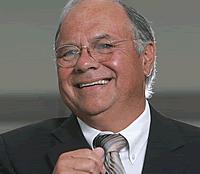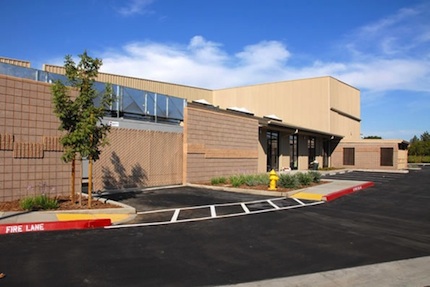IT Trends | Q&A
Leading Open Source in the Community College
A prolific innovator for 25 years at California's Delta College, Lee Belarmino may be most recognized nationally in higher education IT for a relatively recent accomplishment: the successful implementation of one of the first instances of the open source Kuali Financial System--a system the college helped develop as a founding partner alongside much larger and better-funded universities.
Lee Belarmino, the just-retired vice president of IT at San Joaquin Delta College in Stockton, CA, made such numerous and varied contributions during his tenure at the institution that the college's board named a new technology building on campus after him--the Lee Belarmino Sr. District Data Center.
But Belarmino, who retired Oct. 1, pointed to his institution's commitment to open source as its single most significant move under his leadership. It was just seven years ago when he and his president at the time, Raul Rodriguez, decided that in order for the college to best leverage technology to support the institution's mission, it should join with other leading institutions in the community source model.
A prolific innovator for 25 years at Delta College, Belarmino is most recognized nationally in higher education IT for a relatively recent accomplishment: the successful implementation of one of the first instances of the open source Kuali Financial System. Throughout the development of Kuali, Belarmino and his college's functional and technical staff were major contributors to KFS development. Working as a founding partner alongside Kuali Foundation institutions including Indiana University, Cornell University, the University of Hawaii, Michigan State University, and the University of Arizona, Delta College was the only community college developer.
Belarmino said he believes he's leaving his institution with a sustainable and affordable future with respect to technology to serve the institutional mission and said he thinks he has demonstrated the validity of open source in the community college environment, providing a model for other community colleges--a particularly timely contribution in the current challenging economic environment.
Mary Grush: What are some of the benefits you've derived for Delta College in the move to open source?
Lee Belarmino: For Delta College, open source software offers all the advantages of a homegrown system, especially in that the institution is not locked into one way of doing business and can make needed changes, when they are needed as business practices change at the college. For example, right now the institution is in the middle of an extensive re-engineering to "right size" its budget based on the severe cutbacks in funding in California. To be responsive to these economic pressures, the college is going to have to change some critical processes immediately. Happily, the flexibility and latitude are there to make those changes directly to the financial system--the Kuali Financial System--on a timely basis and at a reasonable cost.

| Lee Belarmino: "We committed our limited resources to the open source Kuali Financial System, and we had to succeed. So relative to the other Kuali partners, we brought a sense of urgency to the table." |
The college also has the support of a large community of developers, beyond its talented but relatively tiny IT staff. For example, the Kuali community as a whole supports the code and keeps all the code revisions in place. The community provides the rigorous scrutiny you need when you make changes to software. And of course Delta College benefits from sharing best practices with an amazing community of developers from an array of Kuali member institutions.
Grush: One of the striking things about your work in open source is that your institution shared--and continues to share--in the development of Kauli as really the only community college taking an early interest and investing in open source development and community source leadership. What were some of things your institution's leadership considered in getting Delta College involved with the open source community? Were there any special characteristics of the community college environment that were factors the decision process?
Belarmino: Community colleges vary in their IT requirements and in the ways their IT departments are set up, but one thing is true for them all: They don't have large development staffs, and they don't have a lot of resources to invest in the development of software. In our case, our president made the decision to go with open source. There were some overall drivers in that decision process. Primarily, we looked at the functionality and cost of big ERP systems and found that with a vended ERP system we would pay, in the total cost of ownership over five to 10 years, much more money and would end up with considerably less flexibility. So we had to weigh that against the impact of getting involved with the Kuali community, given our more modest resources as a community college. We decided, after due and careful consideration, that open source was a much better option for us in the long run. And we felt strongly that our work in community source development would ultimately be a significant contribution to the higher education community as a whole: The hope, long term, is to see funds saved on the administrative side shifted to systems for teaching and learning.

The Lee Belarmino Sr. District Data Center on the campus of San Joaquin Delta College in Stockton, CA |
Grush: As the pioneering community college in open source development, did Delta College bring some special contributions to the community source movement in higher education?
Belarmino: First, being a community college and having a small staff, we were making a much larger effort, proportionately, than the other Kuali partners. And our decision to go with open source could not be an experiment or pilot project: We committed our limited resources to the open source Kuali Financial System, and we had to succeed. So relative to the other Kuali partners, we brought a sense of urgency to the table. Every community college can relate to this. And the Kuali Foundation and membership were responsive to the realities we live with in community colleges.
Second, as a community college answering to the state of California, we needed more granularity built into the system (based on adding and defining a "code") for the purposes of accountability. We had to make the argument for this functionality to the Kuali Functional Board, which voted to make it a priority for the Kuali Financial System development process. The KFS developers refined our functional requirement further by designing a whole new process for defining a "code"--giving our function legs for the future in that other institutions will now be able to get the degree of granularity they need to meet their own requirements. Having this functionality right in the software--not just as a subsystem or a patch to a larger system--serves to make KFS flexible enough to accommodate the needs of community colleges in the future and has helped make it an elegant and durable software solution for all Kuali users.
Grush: Are there some real opportunities today, and in the future, for community colleges in open source?
Belarmino: For community colleges interested in open source today, there are some really good options. In the case of colleges looking into Kuali, they can benefit from all the previous development work already done by the Kuali Foundation. New users will inherit the software: They can download it and try it out for free and pay no license fee, if they choose to implement it at their institution. And they have the option to join the Kuali Foundation membership to take full advantage of community support and to participate in and influence the future direction of KFS plus a whole suite of Kuali software.
I also think that ERP system vendors will soon need to move toward a more modular approach, offering "best of breed" products for colleges and universities to pick up as needed: We will see the demise of the monolithic ERP system as we know it. There will be a new marketplace for colleges to "mix and match" community source and vended offerings, with new possibilities for tremendous cost savings and greater flexibility.
I'm excited about a future that will hold significant opportunities in the open source model for community colleges--both with the Kuali suite of administrative software and with software for teaching and learning--going forward.

